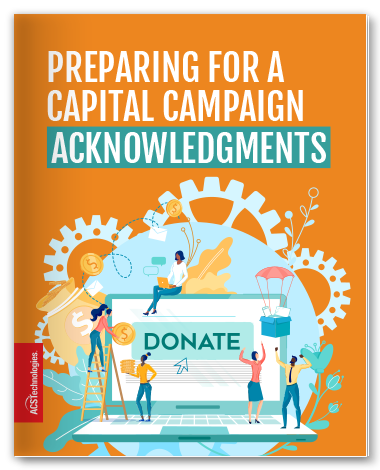Preparing for a Capital Campaign Part 3 of 4
The old saying ‘time is money’ takes on a new meaning through the lens of donor relations. Cultivating authentic donor relationships is a significant investment of time, for both the donor and ourselves. The commitment of time spent learning about our ministry or our project is far more valuable – and a longer-term asset – than any gift donors could give us financially.
In this blog series about preparing for a capital campaign, we’re examining how we treat our givers through the fundamentals of acknowledgements. One of the most critical lessons in this area is valuing the donor’s time for both the short- and long-term.
Short-term:
Honor their time by sticking to your schedule and by thanking them for the meeting. How many times have you been in a meeting you were told would last an hour and it’s running far longer? Don’t do that to your prospects and donors – you might not get a repeat visit. Be professional and stick closely to an agreed-upon meeting length. Respect the valuable time a donor gives you and always, always thank them for it.
Long-term:
Remember that investing time in these relationships reaps benefits for your donor and for the ministry far beyond any monetary gift. You will develop a deeper understanding of your donor’s interests and passions by spending intentional time relationally. We have to be sure we’re meeting with and thanking our donors and members often, and not just when we’re asking or when they’ve done something tangible.
Consider the investments of time that your volunteers give your church and ministry as a gift. Some organizations even record and recognize those volunteer hours as “donations” in much the same way they would a monetary gift. Imagine the hard costs you’d incur without your core volunteers and think of them as donors of a very valuable commodity.
Volunteers
There’s ample evidence that people who volunteer and “get their hands dirty” for a ministry or cause are more likely to give more financially – and more often – than those who don’t. It’s another way to reflect on the concept that ‘time is money’ and value those who give us both.
So before you kick off a campaign, be sure your full staff understands the value of the volunteers’ time – from your board and campaign committee to the donors you’ll meet with about the project. Acknowledge that time given, and look for special ways to honor and thank them for it.
In the final blog of this series, we’ll talk about how you “earn the right” to make an ask of a donor in support of the capital campaign in your church.
For more information on consulting for Capital Campaigns, visit ACST’s Consulting pages.
The Foundation of a Successful Capital Campaign is Built on Donor Acknowledgment
When a capital campaign isn’t successful, it usually comes back to a handful of common mistakes organizations make. Not preparing adequately is at the top of the list.
Churches, especially, often rush into and launch a campaign too quickly. It’s understandable, but there are systems and processes to ensure you don’t miss the mark or kick off a campaign with a goal you can’t achieve.
Considering a Capital Campaign?
Capital campaigns are a daunting task, even under the best circumstances. If you’ve been considering — or putting off — a capital campaign to raise funds to grow your church or expand your ministry, the solution is here.
ACS Technologies® teamed up with Non-Profit DNA to offer an extensive and comprehensive consulting service to help make your upcoming capital campaign a success. Through this partnership, you’ll have access to highly skilled, knowledgeable fundraising experts. They will help with your campaign — every step of the way.
Visit Capital Campaigns on our website to request your consultation today!
Tim has over 30 years of experience in Church, Non-Profit Administration, Management, and Fund Development. Serving as an Executive Pastor and Chief Development Officer in growing Churches and Non-Profit Organizations. He has provided a wide range of expertise and resources. Tim serves as the Founder and CEO of Non-Profit DNA. A boutique firm committed to helping nonprofits and churches. By building their capacity through fundraising, leadership, team building, staff recruiting, and coaching.





